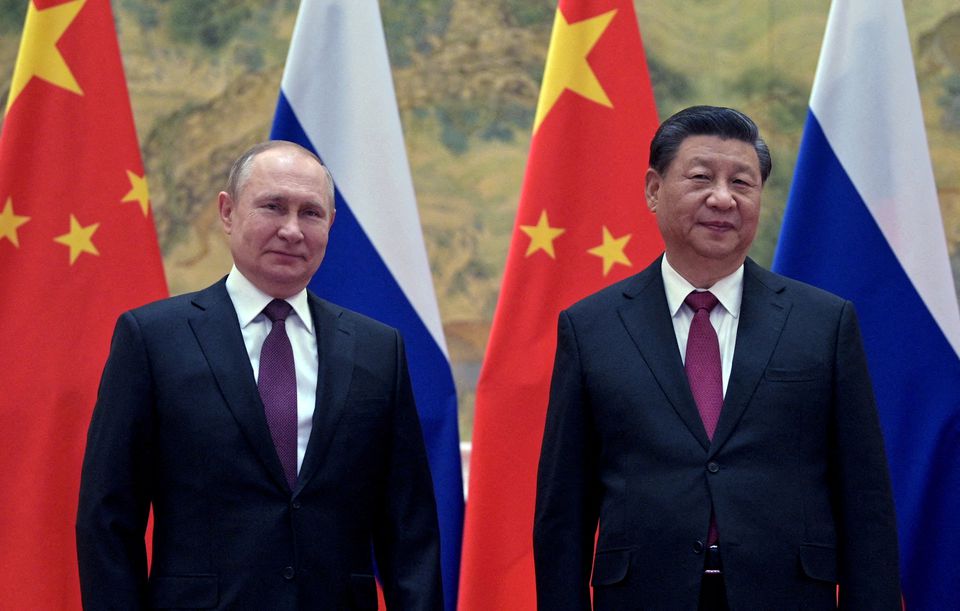Two months after warning that Beijing appeared poised to help Russia in its fight against Ukraine, senior U.S. officials say they have not detected overt Chinese military and economic support, a welcome development in the tense U.S.-China relationship.
U.S. officials told Reuters in recent days they remain wary about China’s long-standing support for Russia in general, but that the military and economic support that they worried about has not come to pass, at least for now. The relief comes at a pivotal time.
“We have not seen the PRC provide direct military support to Russia’s war on Ukraine or engage in systematic efforts to help Russia evade our sanctions,” a Biden administration official told Reuters, referring to the People’s Republic of China.
“We continue to monitor for the PRC and any other country that might provide support to Russia or otherwise evade U.S. and partner sanctions.”
As well as steering clear of directly backing Russia’s war effort, China has avoided entering new contracts between its state oil refiners and Russia, despite steep discounts.
In March its state-run Sinopec Group suspended talks about a major petrochemical investment and a gas marketing venture in Russia.
Last month, the U.S. envoy to the United Nations hailed China’s abstentions on U.N. votes to condemn Russia’s invasion of Ukraine as a “win,” underscoring how Beijing’s enforced balancing act between Russia and the West may be the best outcome for Washington.
Still, China has refused to condemn Russia’s actions in Ukraine and has criticized the sweeping Western sanctions on Moscow.
Trade volume between Russia and China also jumped in the first quarter, and the two declared a “no limits” partnership in February.
On Monday, Beijing’s Washington embassy issued a 30-page newsletter accusing the United States of spreading “falsehoods” to discredit China over Ukraine, including through a March press leak saying Russia had sought Chinese military help. The embassy noted that U.S. officials had since said they had seen no evidence of China providing such support.
Biden himself has not spoken of China helping Russia since telling reporters in Brussels March 24 that in a phone call with Chinese President Xi Jinping, he “made sure he understood the consequences.”
Secretary of State Antony Blinken told the Senate Foreign Relations Committee last week China is dealing with the “significant reputational risk” of being Russia’s ally and that “for now we’re not seeing significant support from China for Russia’s military actions.”
Biden is to visit Tokyo and Seoul in what will be his first trip to Asia as president – one that won’t include a stop in China. He’ll meet with Indian and Australian leaders too, during a ‘Quad’ meeting in Tokyo.
China has made Russia a key part of its foreign policy strategy to counter the West. Biden aides were worried Xi was planning to provide direct support to Russian President Vladimir Putin as his campaign in Ukraine faced fierce setbacks, one U.S. official said.
They were heartened this has not happened so far, but Washington and its allies are continuing to closely monitor the level of assistance, the official said.
Bonnie Glaser, an Asia expert at the German Marshall Fund of the United States, said stark warnings by the U.S. and European Union have paid off so far.
“There has been consistent messaging that if China does so it will face severe consequences. It appears that so far, the Chinese have not. It is feasible that the Chinese planned to provide military assistance and changed their minds,” she said.
However U.S. officials remain concerned about China’s refusal to condemn Russia’s actions in Ukraine and what they say is its continued parroting of Russian disinformation.
Deputy Secretary of State Wendy Sherman said on April 21 that Beijing had “repeatedly drawn false equivalencies between Russia’s war of aggression and Ukraine’s self-defensive actions.”
She added: “Let’s be clear, China’s already doing things that do not help this situation.”


